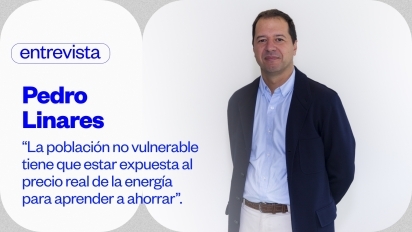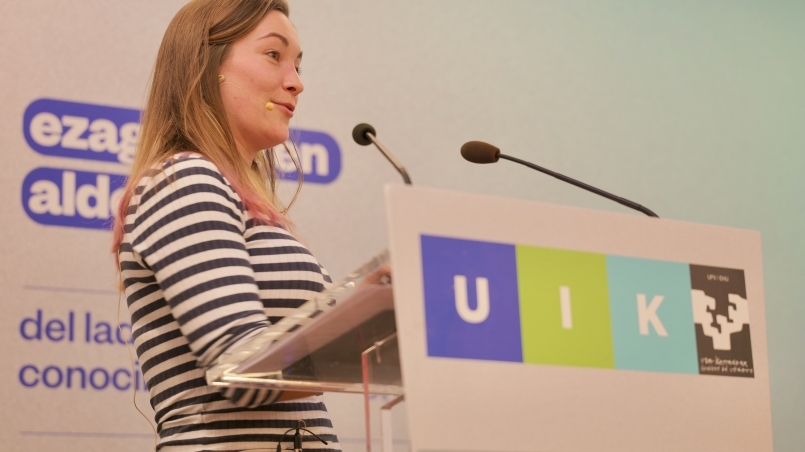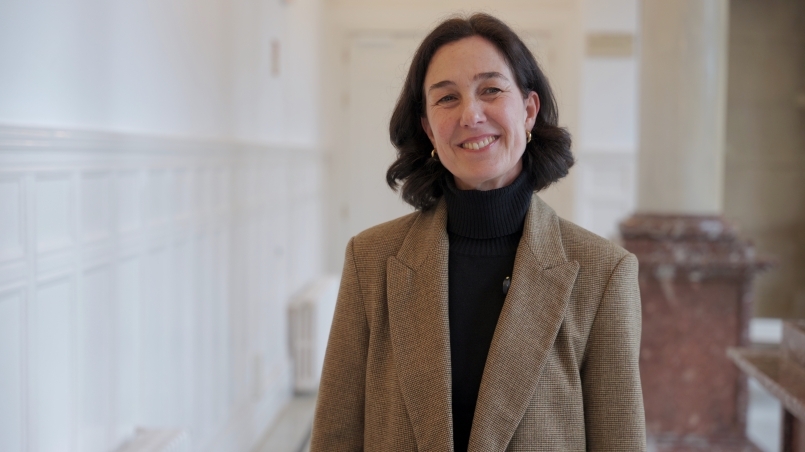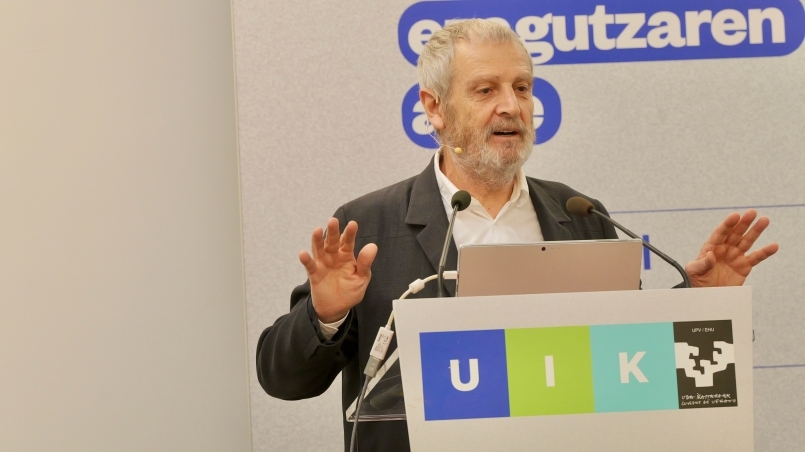"There is a part of the population that needs to be exposed to the real prices of energy, so that they really know what it costs and know how to save"
Pedro Linares: Let's be smart. Short-term actions and long-term attitudes.

The emergency situation is one thing, but having a long-term vision is another. "What worries me is that we don't mix the two situations and that by wanting to fix an emergency we don't spoil what needs to be fixed in the medium and long term. Sometimes things get mixed up out of political opportunism, forgetting that we have to prepare for the future".
"Oil prices are falling and will probably stabilise, but gas prices are expected to take a couple of years to return to reasonable levels. The question is knowing how to manage these two years while preparing for a market that is going to be different to the one we have now".
This is what Pedro Linares, professor at the Pontifical University of Comillas and speaker at the course organised by BC3 (Basque Centre for Climate Change) on "New proposals for the climate crisis in the current geopolitical and energy context", says: "If we talk about energy markets, I think it is important to know how to manage these two years while preparing for a market that is going to be different from the one we have now".
"If we talk about energy markets, I like to underline that, for an average family, spending on electricity is less than spending on petrol or even gas. We always talk about electricity market reform as if it were the Holy Grail, but we spend more money on other energies that we talk less about".
"The big discussion at the moment is whether to replace the current market or make adjustments to it. I am more in favour of making adjustments. We have already experienced situations in which there was no market and the ministry of the day said what had to be done. Consumers ended up paying for it".
There are adjustments that can be made, such as encouraging long-term contracting, even requiring part of it from the distributors, as is done in some countries.
In the short term, the problems are twofold: cutting consumption and protecting against high prices. We have to be very careful with protection measures because "when you apply measures to make energy cheaper for everyone, all you are doing is encouraging consumption instead of saving. If we have problems with gas, we have to take measures for vulnerable households and businesses, and for those who can afford it, we have to confront them with the prices that exist".
In Germany they are scared about gas, but the rise in electricity has not been so high because they were used to having long-term contracts. Imbuing a culture that if you insure your car or your home, you also insure the cost of your energy supply. "In Spain we still think that when we have a problem, the government will come to save us. I don't understand why many energy-intensive industries did not have long-term contracts when the energy crisis hit. If the measures are going to maintain inappropriate behaviour because the government will always protect us, where is the saving or the defence against the volatile markets that will continue to accompany us?.
The question is not to put generalised caps on prices because maybe we encourage consumption that we don't have to have. "There is a lot of demagogy and populism in current politics. The situation requires a well thought-out and consensual solution, not electioneering measures.
Spain is hardly going to have a lack of gas supply. It has a very robust network of regasification plants that allows it to bring gas from many parts of the world. "What we will have is an increase in prices due to the tension in the market, which forces us to reduce consumption as much as possible. Firstly, to relax the market and secondly to save a lot of money. The absolute priority should be smart savings. That is, savings in industry (residential and commercial gas consumption is 20-25 %.) By adjusting thermostats, we save 7% but only of that 20%. In any case it is all very well to save on unnecessary expenses, but in the short term there are very few things to do. "We have to think about technological improvements of the equipment and start investing with a 2-year view, looking at where the saving potential of the industry is.
There are already technologies for saving energy, but many industries have not taken it up due to a lack of investment capacity or because they have not considered it a priority. Pedro Linares gave as an example the Spanish agri-food sector which, being a large consumer, has not considered energy as a problem. Replacing gas with heat pumps powered by renewables is already profitable in the sector. Their problem is to get the raw material at a good price and sell well, not to save energy, even if it has an impact on the final price of the product. It is not their priority and they need a push. The funds could be focused on this type of investment, on gas recovery systems or cogenerations that are abandoned but which are interesting at the moment. What Pedro Linares insisted on was that "there are no magic solutions that work from one month to the next" and that "when there are water cuts in a city, people start to save, but with energy, people do not understand the need to save". "If we are also protecting them against high prices, they can continue to do the same (although it is true that we are starting to see some reductions). We have to see how to make people aware of the need to save. The way prices are, any percentage of savings is important".
Short-term measures cannot be very powerful; those adopted in two years' time will allow us to be less exposed to price volatility and will help us to make the transition.
Savings and the gradual replacement of gas in electricity generation by renewable energies.
"I am not worried about Germany going back to coal for a couple of years. What worries me is that we are going to create new coal-fired power plants and continue to use coal for another 20 years. What is clear is that it is renewables that are going to get us out of the situation. In the long term, more renewables, even if some people have to use fossil fuels temporarily. Everything that is invested in renewables is money we save compared to coal and gas. "The targets we had set ourselves before the crisis were already difficult, but now we know that the more we accelerate them the better because they will allow us to get out of the crisis faster.
The energy transition that is being sold to us is nuanced. "Until we reach the necessary level of renewables in 20 years' time, gas will still be there and we will still need it to obtain them. We will pay dearly for our electricity because we will have to build storage systems. Investors are no longer betting on either gas or oil, which will lead to a substantial drop in supply that may prevent what some say about lower prices. "The mess did not start with Putin but with China's post-Covid recovery a year earlier that required a lot of gas. Volatility and exposure to high prices is something we will continue to have for the next 20 years. The more we can protect ourselves from that volatility, the better".
More savings, more renewables and more awareness of price volatility without expecting them to come and save us.
Pedro Linares, opposed to universal subsidies, recognises that some are worthwhile. First to the vulnerable out of sheer fairness and because they can attract desirable behaviour from the population. Encouraging people to make a small investment often pays off positively. Smart subsidies that are well measured and well targeted. Pedro Linares would end the 20 cents fuel subsidy or the cap on gas prices and give vulnerable households and businesses a direct cheque for their energy use. The Treasury already knows which families should receive the cheque. The rest of the population should be exposed to prices. Faced with a €2.5 petrol price could lead to more responsible consumption, i.e. less consumption. Pedro Linares recalled that the idea of the cheque was already recommended by Economics for Energy in 2015.
"There is a part of the population that needs to be exposed to real energy prices, so that they really know what it costs and know how to save". Energy efficiency programmes need to be targeted at vulnerable populations. "We all know who they are and where they live. We all know who they are and where they live. Set up an energy rehabilitation strategy in the slums that were built in the 60s and are an energy disaster". Another fact provided by Pedro Linares: subsidies for electric cars are being taken by high-income people who buy a second vehicle without decommissioning their old one.
Integral housing renovation is expensive and takes time, but express renovations allow savings with interior insulation and not in the whole building envelope, changing windows, changing boilers, more efficient appliances (with aid for people who cannot afford it and not for those who were going to do it anyway). Coffee for all is an overspend and ends up on people who don't need it.
All new buildings should be Passive House certified. "It is not enough to install solar panels and that's it". Spain is way behind in this area.
"It is in the industrial sector where we still don't know how to get rid of fossil fuels. The steel industry, the cement industry, the tile industry, which is so important in Spain and which seems to be starting to study the use of hydrogen, are still fossil fuel consumers. "It is urgent to invest now with a view to 30 years because it is not sustainable to maintain the current technology.
Pedro Linares prefers to talk about renewable gases rather than hydrogen, but he is sure that for a large part of the industry its future lies in its use as a fuel to abandon fossil fuels. Even so, he raises several questions. Although we have the cheapest renewables for hydrogen production, North Africa has the cheapest and demand is not going to be so great. Industry will, but the rest is going to electrify. There will be an interesting market for hydrogen where Spain will play an important role, but it is a market with very little added value. It is better for us to invest hydrogen in our industries to sell decarbonised products than not to think about being hydrogen exporters.
Until fossil fuel prices rise further and hydrogen production becomes cheaper, it will be practically anecdotal. What is needed are real tests of its use in industry, pilot projects and small demonstration plants to prove its validity. Further research is needed to improve its production and, when the time comes, to be ready.
Pedro Linares is not at all sure whether the Midcat pipeline will be a reality in one year or whether it will take 2 or 3 years when it is no longer needed. Germany is interested, but they are also investing in floating regasification plants. It might be more interesting to send liquefied gas directly by ship. As a future hydrogen pipeline, he is not sure either, because in the future it may be more efficient to convert it into ammonia and export it. "There are so many uncertainties that investing in fixed gas infrastructures at the moment seems to me to be a very risky bet".
What do we do with the market design? Is it convenient to keep the marginalist model? How are prices set in the market? With current gas prices, are there people who are making a lot of money? The solutions are very complicated. What Pedro Linares is clear about is that long-term contracting must be stimulated.


